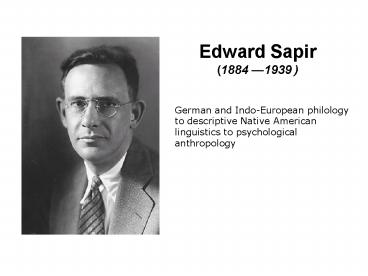Edward Sapir (1884 - PowerPoint PPT Presentation
1 / 13
Title:
Edward Sapir (1884
Description:
... to descriptive Native American linguistics to psychological anthropology ... classical languages to Mayan, anthropology, Hopi via Sapir. Languages in ... – PowerPoint PPT presentation
Number of Views:891
Avg rating:3.0/5.0
Title: Edward Sapir (1884
1
Edward Sapir (1884 1939 )
German and Indo-European philology to descriptive
Native American linguistics to psychological
anthropology
2
Sapir, The Status of Linguistics as a Science
- Humans are at the mercy of the language they
speak - No two languages are exactly the same in the way
they provide speakers with unconscious categories - Language is a guide to social reality
- All human behavior is symbolic
- Language is a key to analysis of unconscious
symbols
3
Benjamin Lee Whorf (1897 1941 )
Chemical engineer (MIT), fire insurance
inspector, amateur linguist ciphers, classical
languages to Mayan, anthropology, Hopi via Sapir
4
Languages in cultures
Language as form Linguistic elements can be
studied as contrasting and complementary forms.
Examination of their arrangement, rules for
combination, generating surface structure.
(Bloomfield, Chomsky) Language as action People
say things and mean something. They do things
with words. Language is more than communication,
it is also understanding the world, creating the
world. (Sapir, Whorf, Hymes)
5
Wilhelm von Humboldt (1767-1835)
- Language as Weltanschaung (worldview)
- Each tongue draws a circle about the people to
whom it belongs, and it is possible to leave this
circle only by simultaneously entering that of
another people. - but one always caries over into a foreign tongue
to a greater or lesser degree ones own cosmic
viewpoint indeed ones personal linguistic
pattern.
6
Linguistic Relativity
The categories and types that we isolate from
the world of phenomena we do not find there
because they stare every observer in the face on
the contrary, the world is presented in a
kaleidoscopic flux of impressions which has to be
organized by our mindsand this means largely by
the linguistic systems in our minds. (213) B.
L. Whorf
7
Vocabulary and Classification
Basic/primary colour terms blue, green,
yellow, orange, red, white, black Daribi
huzhuku - dark mama - light Russian
goluboy - sky blue siniy - blue, dark
blue Derivative colour terms violet, aqua,
turquoise
8
Colour terms
Two colour terms white and black (light
dark) Three red, white, black Four yellow or
green, red, white, black Five yellow, green,
red, white, black Six blue, yellow, green, red,
white, black Seven brown, blue, yellow, green,
red, white, black Eight purple/pink/orange/grey
above
Red is red in nearly any language
9
Eskimo words for snow
Boas Introduction to HAIL (1911 21-22) aput
- snow on the ground qana - falling snow
piqsirpoq - drifting snow qimuqsuq -
snowdrift Whorf English one word (snow)
Eskimo - three words We have the same word for
falling snow, snow on the ground, snow packed
hard like ice, slushy snow, wind-driven flying
snow To an Eskimo, this all-inclusive word
would be almost unthinkable he uses different
words for them and for other kinds of snow. So
what?
10
SAE Objectification
John Locke (1632-1704) An Essay Concerning Human
Understanding Idea the object of the
understanding when a man thinks All ideas come
from sensation or reflection Most important
simple idea is solidity
11
Form and Content
SAE dualities - body and soul The form (shape,
structure, appearance) can be separated from
the content (material, essence, nature) of the
thing. Hopi people dont make a necessary
distinction between form and content, dont rely
on objects in space as a primary metaphor for
time, person, other qualities
12
Trains moving really fastSingle constant speed
of light (c)
- Train A moving at 1/2c
- Train B moving at 3/4c
- From Train A, it looks like the clocks in Train B
are running slower and their meter stick is
shorter.
13
Fig. 11overview
.








![Edward Sapir [1884-1939] PowerPoint PPT Presentation](https://s3.amazonaws.com/images.powershow.com/4199349.th0.jpg?_=201309230411)






















